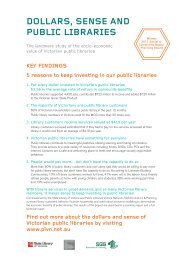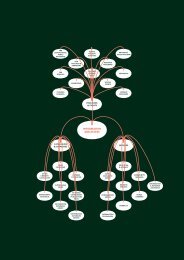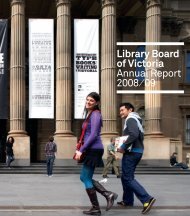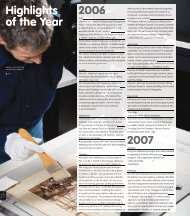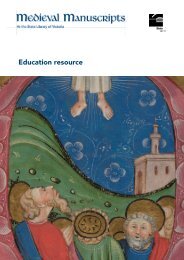Library Board and corporate governance - State Library of Victoria
Library Board and corporate governance - State Library of Victoria
Library Board and corporate governance - State Library of Victoria
Create successful ePaper yourself
Turn your PDF publications into a flip-book with our unique Google optimized e-Paper software.
6.5 Welfare manager<br />
The welfare manager is responsible for looking after the general<br />
welfare <strong>of</strong> the whistleblower. The welfare manager will:<br />
examine the immediate welfare <strong>and</strong> protection needs <strong>of</strong><br />
a whistleblower who has made a disclosure <strong>and</strong> seek<br />
to foster a supportive work environment;<br />
advise the whistleblower <strong>of</strong> the legislative <strong>and</strong><br />
administrative protections available to him or her;<br />
listen <strong>and</strong> respond to any concerns <strong>of</strong> harassment,<br />
intimidation or victimisation in reprisal for making disclosure;<br />
ensure the expectations <strong>of</strong> the whistleblower are realistic.<br />
7 Confidentiality<br />
The <strong>Library</strong> will take all reasonable steps to protect the identity<br />
<strong>of</strong> the whistleblower. Maintaining confi dentiality is crucial<br />
in ensuring reprisals are not made against a whistleblower.<br />
The Act requires any person who receives information<br />
due to the h<strong>and</strong>ling or investigation <strong>of</strong> a protected disclosure, not<br />
to disclose that information except in certain limited circumstances.<br />
Disclosure <strong>of</strong> information in breach <strong>of</strong> section 22 constitutes an<br />
<strong>of</strong>fence that is punishable by a maximum fi ne <strong>of</strong> 60 penalty units<br />
($6000) or six months imprisonment or both.<br />
The circumstances in which a person may disclose<br />
information obtained about a protected disclosure include:<br />
where exercising the functions <strong>of</strong> the public body<br />
under the Act;<br />
when making a report or recommendation under the Act;<br />
when publishing statistics in the annual report<br />
<strong>of</strong> a public body; <strong>and</strong><br />
in criminal proceedings for certain <strong>of</strong>fences in the Act.<br />
However, the Act prohibits the inclusion <strong>of</strong> particulars in any report<br />
or recommendation that is likely to lead to the identifi cation <strong>of</strong> the<br />
whistleblower. The Act also prohibits the identifi cation <strong>of</strong> the<br />
person who is the subject <strong>of</strong> the disclosure in any particulars<br />
included in an annual report.<br />
The <strong>Library</strong> will ensure all fi les, whether paper or<br />
electronic, are kept in a secure room <strong>and</strong> can only be accessed<br />
by the protected disclosure coordinator, protected disclosure<br />
<strong>of</strong>fi cer, the investigator or welfare manager (in relation to<br />
welfare matters). All printed material will be kept in fi les that<br />
are clearly marked as a Whistleblower Protection Act matter,<br />
<strong>and</strong> warn <strong>of</strong> the criminal penalties that apply to any unauthorised<br />
divulging <strong>of</strong> information concerning a protected disclosure.<br />
All electronic fi les will be produced <strong>and</strong> stored on a st<strong>and</strong>-alone<br />
computer <strong>and</strong> be given password protection. Backup fi les will be<br />
kept on fl oppy disk. All materials relevant to an investigation,<br />
such as tapes from interviews, will also be stored securely with<br />
the whistleblower fi les.<br />
The <strong>Library</strong> will not email documents relevant to a<br />
whistleblower matter <strong>and</strong> will ensure all phone calls <strong>and</strong> meetings<br />
are conducted in private.<br />
8 Collating <strong>and</strong> publishing statistics<br />
The protected disclosure coordinator will establish a secure<br />
register to record the information required to be published in<br />
the annual report, <strong>and</strong> to generally keep account <strong>of</strong> the status<br />
<strong>of</strong> whistleblower disclosures. The register will be confi dential <strong>and</strong><br />
will not record any information that may identify the whistleblower.<br />
The register will contain the following information:<br />
the number <strong>and</strong> types <strong>of</strong> disclosures made<br />
to public bodies during the year;<br />
the number <strong>of</strong> disclosures referred to the Ombudsman<br />
for determination as to whether they are public<br />
interest disclosures;<br />
the number <strong>and</strong> types <strong>of</strong> disclosed matters referred to<br />
the public body by the Ombudsman for investigation;<br />
the number <strong>and</strong> types <strong>of</strong> disclosures referred by the<br />
public body to the Ombudsman for investigation;<br />
the number <strong>and</strong> types <strong>of</strong> investigations taken<br />
over from the public body by the Ombudsman;<br />
the number <strong>of</strong> requests made by a whistleblower<br />
to the Ombudsman to take over an investigation<br />
by the public body;<br />
the number <strong>and</strong> types <strong>of</strong> disclosed matters that<br />
the public body has declined to investigate;<br />
the number <strong>and</strong> types <strong>of</strong> disclosed matters that were<br />
substantiated upon investigation <strong>and</strong> the action taken<br />
on completion <strong>of</strong> the investigation; <strong>and</strong><br />
any recommendations made by the Ombudsman that<br />
relates to the public body.<br />
9 Receiving <strong>and</strong> assessing disclosures<br />
9.1 Has the disclosure been made in accordance<br />
with Part 2 <strong>of</strong> the Act?<br />
Where a disclosure has been received by the protected disclosure<br />
<strong>of</strong>fi cer or by the protected disclosure coordinator, he or she will<br />
assess whether the disclosure has been made in accordance<br />
with Part 2 <strong>of</strong> the Act <strong>and</strong> is, therefore, a protected disclosure.<br />
9.1.1 Has the disclosure been made to the appropriate person?<br />
For the disclosure to be responded to by the <strong>State</strong> <strong>Library</strong>, it<br />
must concern an employee, member or <strong>of</strong>fi cer <strong>of</strong> the <strong>Library</strong>. If the<br />
disclosure concerns an employee, <strong>of</strong>fi cer or member <strong>of</strong> another<br />
public body, the person who has made the disclosure must be<br />
advised <strong>of</strong> the correct person or body to whom the disclosure<br />
should be directed. (See the table in 5.2). If the disclosure has<br />
been made anonymously, it should be referred to the Ombudsman.<br />
9.1.2 Does the disclosure contain the essential elements<br />
<strong>of</strong> a protected disclosure?<br />
To be a protected disclosure, a disclosure must satisfy the<br />
following criteria:<br />
Did a natural person (that is, an individual person rather<br />
than a corporation) make the disclosure?<br />
Does the disclosure relate to conduct <strong>of</strong> a public body<br />
or public <strong>of</strong>fi cer acting in their <strong>of</strong>fi cial capacity?<br />
Is the alleged conduct either improper conduct or<br />
detrimental action taken against a person in reprisal<br />
for making a protected disclosure?<br />
Does the person making a disclosure have reasonable<br />
grounds for believing the alleged conduct has occurred?<br />
Where a disclosure is assessed to be a protected disclosure, it is<br />
referred to the protected disclosure coordinator. The protected<br />
disclosure coordinator will determine whether the disclosure<br />
is a public interest disclosure.<br />
Where a disclosure is assessed not to be a protected<br />
disclosure, the matter does not need to be dealt with under the Act.<br />
The protected disclosure <strong>of</strong>fi cer will decide how the matter should be<br />
responded to in consultation with the protected disclosure coordinator.<br />
9.2 Is the disclosure a public interest disclosure?<br />
Where the protected disclosure <strong>of</strong>fi cer or coordinator has received<br />
a disclosure that has been assessed to be a protected disclosure,<br />
the protected disclosure coordinator will determine whether the<br />
disclosure amounts to a public interest disclosure. This assessment<br />
will be made within 45 days <strong>of</strong> the receipt <strong>of</strong> the disclosure.<br />
In reaching a conclusion as to whether a protected<br />
disclosure is a public interest disclosure, the protected disclosure<br />
coordinator will consider whether the disclosure shows, or tends<br />
to show, that the public <strong>of</strong>fi cer to whom the disclosure relates:<br />
has engaged, is engaging or proposes to engage<br />
in improper conduct in his or her capacity as<br />
a public <strong>of</strong>fi cer; or<br />
has taken, is taking or proposes to take detrimental action<br />
in reprisal for the making <strong>of</strong> the protected disclosure.<br />
Where the protected disclosure coordinator concludes that the<br />
disclosure amounts to a public interest disclosure, he or she will:<br />
notify the person who made the disclosure<br />
<strong>of</strong> that conclusion; <strong>and</strong><br />
refer the disclosure to the Ombudsman for formal<br />
determination as to whether it is indeed a public<br />
interest disclosure.<br />
Where the protected disclosure coordinator concludes that the<br />
disclosure is not a public interest disclosure, he or she will:<br />
notify the person who made the disclosure<br />
<strong>of</strong> that conclusion; <strong>and</strong><br />
advise that person that he or she may request the<br />
public body to refer the disclosure to the Ombudsman<br />
for a formal determination as to whether the disclosure<br />
is a public interest disclosure, <strong>and</strong> that this request<br />
must be made within 28 days <strong>of</strong> the notifi cation.<br />
In either case, the protected disclosure coordinator will make the<br />
notifi cation <strong>and</strong> the referral within 14 days <strong>of</strong> the conclusion being<br />
reached by the public body (the <strong>Library</strong>). Notifi cation to the<br />
whistleblower is not necessary where the disclosure has<br />
been made anonymously.<br />
10 Investigations<br />
10.1 Introduction<br />
Where the Ombudsman refers a protected disclosure to the<br />
<strong>Library</strong> for investigation, the protected disclosure coordinator<br />
will appoint an investigator to carry out the investigation.<br />
The objectives <strong>of</strong> an investigation will be:<br />
to collate information relating to the allegation as quickly<br />
as possible. This may involve taking steps to protect or<br />
preserve documents, materials <strong>and</strong> equipment;<br />
to consider the information collected <strong>and</strong> to draw<br />
conclusions objectively <strong>and</strong> impartially;<br />
to maintain procedural fairness in the treatment <strong>of</strong> witnesses<br />
<strong>and</strong> the person who is the subject <strong>of</strong> the disclosure; <strong>and</strong><br />
to make recommendations arising from the conclusions<br />
drawn concerning remedial or other appropriate action.<br />
10.2 Terms <strong>of</strong> reference<br />
Before commencing an investigation, the protected disclosure<br />
coordinator will draw up terms <strong>of</strong> reference <strong>and</strong> obtain<br />
authorisation for those terms by the Chief Executive Offi cer.<br />
The terms <strong>of</strong> reference will set a date by which the investigation<br />
report is to be concluded, <strong>and</strong> will describe the resources<br />
available to the investigator to complete the investigation within<br />
the time set. The protected disclosure coordinator may approve,<br />
if reasonable, an extension <strong>of</strong> time requested by the investigator.<br />
The terms <strong>of</strong> reference will require the investigator to make<br />
regular reports to the protected disclosure coordinator who, in<br />
turn, is to keep the Ombudsman informed <strong>of</strong> general progress.<br />
10.3 Investigation plan<br />
The investigator will prepare an investigation plan for approval<br />
by the protected disclosure coordinator. The plan will list the<br />
issues to be substantiated <strong>and</strong> describe the avenue <strong>of</strong> inquiry.<br />
It will address the following issues:<br />
What is being alleged?<br />
What are the possible fi ndings or <strong>of</strong>fences?<br />
What are the facts in issue?<br />
How is the inquiry to be conducted?<br />
What resources are required?<br />
At the commencement <strong>of</strong> the investigation,<br />
the whistleblower should be:<br />
notifi ed by the investigator that he or she has been<br />
appointed to conduct the investigation;<br />
asked to clarify any matters; <strong>and</strong><br />
asked to provide any additional material<br />
he or she might have.<br />
The investigator will be sensitive to the whistleblower’s possible<br />
fear <strong>of</strong> reprisals <strong>and</strong> will be aware <strong>of</strong> the statutory protections<br />
provided to the whistleblower.<br />
10.4 Natural justice<br />
The principles <strong>of</strong> natural justice will be followed in any investigation<br />
<strong>of</strong> a public interest disclosure. The principles <strong>of</strong> natural justice<br />
concern procedural fairness <strong>and</strong> ensure a fair decision is reached<br />
by an objective decision maker. Maintaining procedural fairness<br />
protects the rights <strong>of</strong> individuals <strong>and</strong> enhances public confi dence<br />
in the process. The <strong>Library</strong> will have regard to the following issues<br />
in ensuring procedural fairness:<br />
The person who is the subject <strong>of</strong> the disclosure<br />
is entitled to know the allegations made against him<br />
or her <strong>and</strong> must be given the right to respond.<br />
(This does not mean the person must be advised <strong>of</strong> the<br />
allegation as soon as the disclosure is received or the<br />
investigation has commenced.)<br />
If the investigator is contemplating making a report<br />
adverse to the interests <strong>of</strong> any person, that person should<br />
be given the opportunity to put forward further material<br />
that may infl uence the outcome <strong>of</strong> the report <strong>and</strong> that<br />
person’s defence should be fairly set out in the report.<br />
All relevant parties to a matter should be heard<br />
<strong>and</strong> all submissions should be considered.<br />
A decision should not be made until all reasonable<br />
inquiries have been made.<br />
The investigator or any decision maker should not<br />
have a personal or direct interest in the matter<br />
being investigated.<br />
All proceedings must be carried out fairly <strong>and</strong> without<br />
bias. Care should be taken to exclude perceived bias<br />
from the process.<br />
The investigator must be impartial in assessing the<br />
credibility <strong>of</strong> the whistleblowers <strong>and</strong> any witnesses.<br />
Where appropriate, conclusions as to credibility should<br />
be included in the investigation report.<br />
10.5 Conduct <strong>of</strong> the investigation<br />
The investigator will make contemporaneous notes <strong>of</strong> all<br />
discussions <strong>and</strong> phone calls, <strong>and</strong> all interviews with witnesses<br />
will be taped. All information gathered in an investigation will be<br />
stored securely. Interviews will be conducted in private <strong>and</strong> the<br />
investigator will take all reasonable steps to protect the identity<br />
<strong>of</strong> the whistleblower. Where disclosure <strong>of</strong> the identity <strong>of</strong> the<br />
whistleblower cannot be avoided, due to the nature <strong>of</strong> the<br />
allegations, the investigator will warn the whistleblower <strong>and</strong> his<br />
or her welfare manager <strong>of</strong> this probability.<br />
It is in the discretion <strong>of</strong> the investigator to allow<br />
any witness to have legal or other representation or support<br />
during an interview. If a witness has a special need for legal<br />
representation or support, permission should be granted.


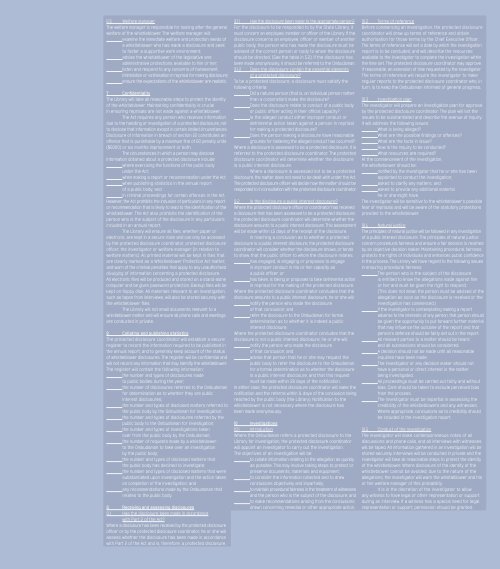
![View a Descriptive List [PDF, 8.2 mb] - State Library of Victoria](https://img.yumpu.com/26316671/1/169x260/view-a-descriptive-list-pdf-82-mb-state-library-of-victoria.jpg?quality=85)
![View a Descriptive List [PDF, 8.2 mb] - State Library of Victoria](https://img.yumpu.com/26316654/1/164x260/view-a-descriptive-list-pdf-82-mb-state-library-of-victoria.jpg?quality=85)
